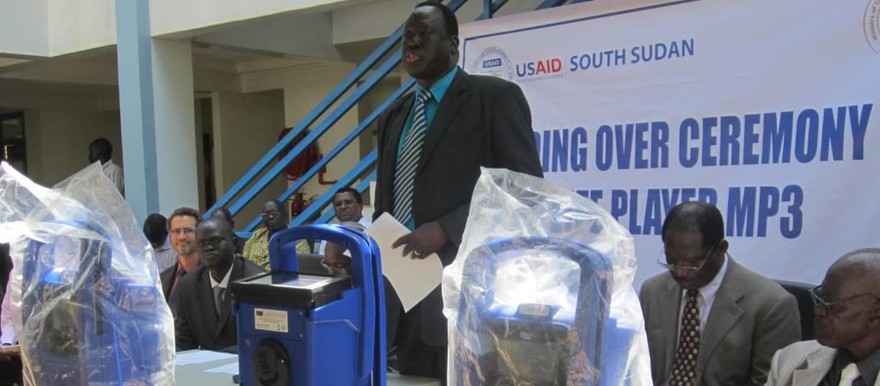The government of the United States of America has donated 3500 radio sets to an education program in South Sudan. The solar-powered radio sets are also digital audio players and will be used by the Ministry of General Education and Instruction.
The US Agency for International Development (USAID) has distributed radios to schools in South Sudan since about 2004. It also funded the non-governmental organization Education Development Center to run the South Sudan Interactive Radio Instruction Program.
This donation aims to support the sustainability of that project, a long-running effort to promote English and other primary school lessons that has been scaled back somewhat in recent years.
EDC’s ‘Learning Village’ and ‘Terbia’ programs were broadcast on shortwave until late 2008 and thereafter on cooperating FM or AM stations and on digital players.
The Undersecretary of the Ministry of General Education Deng Deng Hac Yai speaking at a hand-over ceremony said the audio players will be distributed to 873 primary schools, 359 adult education centres and also to some teacher training institutions all over the country.
An estimated 228,633 primary school children are going to benefit from the recorded programs, said Yai, as well as 28,914 adults and youth including teachers.
Deng further explained that the radio program is going to add value to the national education system and also give a second chance to those who missed school due to the civil war.
The official said that the national strategy is to create opportunities for more learning for people of all ages, giving opportunities to those who missed out on education during the liberation struggle.
“This gives them an opportunity to be able to cope up with the rest,” he explained.
“For this reason, the ministry is going to continue supporting this program with a view of reducing illiteracy in the country which is at 73% to 50% by 2017,” he affirmed.
The Director General for Alternative Education Kuol Atem Bol mentioned that this initiative is a starting point to improve the quality of education in the country. “It is time to talk about quality so that we do not have children sent to study in Uganda and Kenya in search for quality education.”
By Yobu Annet for the Juba Post.



